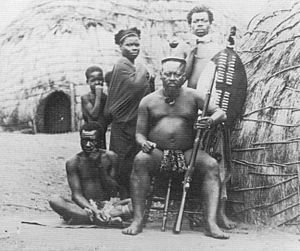Ntshingwayo Khoza facts for kids
Quick facts for kids
Ntshingwayo Khoza
|
|
|---|---|

One of only two photographs known to exist of Ntshingwayo kaMahole. Taken at his kraal during the First Anglo-Zulu War of 1879.
|
|
| Born | c. 1809 |
| Died | 21 July 1883 (aged 72 or 73 years old) oNdini, Zululand |
| Allegiance | Zulu Kingdom |
| Rank | inDuna |
| Commands held | Impi |
| Battles/wars | Anglo-Zulu War |
Ntshingwayo kaMahole (born around 1809 – died July 21, 1883) was a very important military leader for the Zulu Kingdom. He was the main general, called an inDuna, of King Cetshwayo's army. He is best known for leading the Zulu forces during the first Anglo-Zulu War in 1879.
Contents
The Anglo-Zulu War
Ntshingwayo was put in charge of the main Zulu army, known as an Impi, during the British invasion of Zululand in 1879. He faced a difficult situation because he received mixed orders from King Cetshwayo. Publicly, the King told him to attack the British. But privately, the King wanted him to talk with the British first to understand why they were invading.
The Battle of Isandlwana
Despite these confusing orders, Ntshingwayo was very clever. He managed to outsmart the British commander, Lord Chelmsford. Chelmsford had split his forces, sending many soldiers away from their main camp at Isandlwana to search for the Zulu army. This left the camp poorly defended.
Ntshingwayo's regiments, called amabutho, launched a surprise attack on the British camp on January 22, 1879. The Zulu warriors almost completely destroyed the British force. About 1,300 British and allied soldiers were killed. This battle was one of the worst defeats for the British Army during that time.
Even though it was a huge victory, King Cetshwayo was not happy about the large number of Zulu soldiers who died. Hundreds of Zulus were killed and many more were wounded. Historians believe around 1,000 Zulu warriors may have died. Two of Ntshingwayo's own sons were badly hurt in the battle.
A royal officer, Sishishili kaMnqandi, blamed Ntshingwayo for the high Zulu casualties. Because of this, Ntshingwayo did not get all the praise he deserved for his great victory. However, some argue that the King's confusing orders were actually to blame. The Zulu surprise attack was so effective that they had to fight the British right away.
After the War
After the war, King Cetshwayo was held captive in Cape Town and England. When he finally returned to Zululand, many loyal supporters, including Ntshingwayo, came to greet him. The King's return caused problems, dividing people into those who supported the King (called uSuthu) and those who did not.
Conflict with Zibhebhu
Many of the King's followers attacked Prince Zibhebhu kaMaphitha. Zibhebhu was a very brave warrior, an iqawe, and a veteran of Isandlwana. He had caused trouble for Cetshwayo's supporters while the King was away. Zibhebhu tricked the attacking uSuthu forces and defeated them in an ambush.
The King became worried about his safety. He called upon his old amabutho, the same experienced soldiers who fought at Isandlwana. Ntshingwayo was among them. This was against the new British laws in Zululand, which said that no Zulu forces could be raised.
Ntshingwayo's Death
On July 21, 1883, Zibhebhu launched a surprise attack on King Cetshwayo's royal home at oNdini. The experienced amabutho from Isandlwana fought Zibhebhu, but they were defeated. Hundreds of people were trapped and killed, including Ntshingwayo's siblings, Hayiyana and Makhoba.
The King himself was wounded and had to escape. Ntshingwayo was one of the many senior induna who were killed while trying to flee. His childhood friend, Godide Ndlela, also died. The royal home at oNdini was completely destroyed.
It is a sad irony that the great general who won the Battle of Isandlwana was later killed by another warrior who had also fought in that same battle. Today, Ntshingwayo's important role in the Battle of Isandlwana is well-recognized in South African history.
 | Shirley Ann Jackson |
 | Garett Morgan |
 | J. Ernest Wilkins Jr. |
 | Elijah McCoy |

